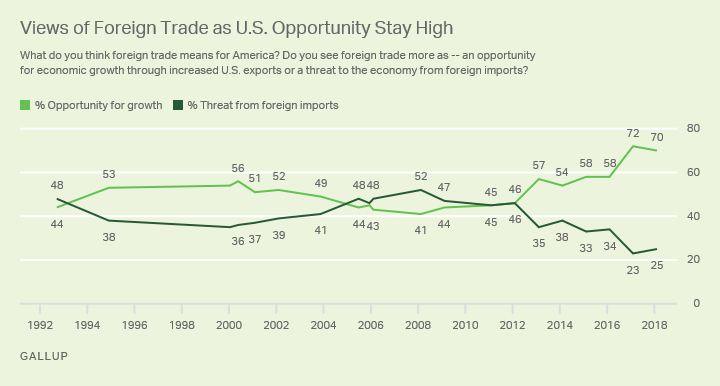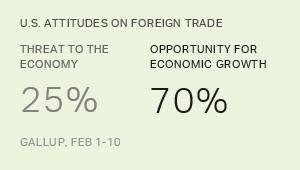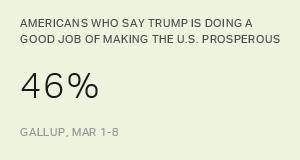President Donald Trump's decision this week to impose tariffs on $50 billion worth of Chinese imports resulted in retaliatory tariffs on an equivalent amount of U.S. goods and raised fears of a trade war between the two countries. These fears triggered volatility in the U.S. stock market, with the Dow plunging hundreds of points following the tariff announcement, only to erase those losses shortly after.
Trump has long alleged that the U.S. is on the losing end of trade with China and other countries and that he intends to review trade agreements, as well as impose tariffs to redress the imbalance. However, Americans overall tend to see trade in a positive, rather than a negative, light.
A firm majority of Americans see opportunity in foreign trade: Seven in 10 U.S. adults (70%) say they see foreign trade as an opportunity for growth in the most recent Gallup survey on the issue in February 2018, little changed from the record-high 72% who said the same last year. A quarter in the U.S. currently say foreign trade is more of a threat, again roughly equivalent to the 23% last year. Americans' attitudes on trade have varied over the years, but have tilted optimistic since 2012.

Americans of all political persuasions see foreign trade as an opportunity: There is little political divide in how U.S. adults view trade. Seventy-one percent of Democrats and 68% of Republicans in 2018 say foreign trade is an opportunity for growth. Their pessimism about trade is also roughly equal, with 27% of Republicans and 25% of Democrats saying foreign trade is a threat to the U.S. economy. These results don't necessarily mean that Americans would oppose tariffs in certain instances, but they illustrate that the public clearly thinks the upside of trade far outweighs its possible economic downside.
| Current survey | 2000-2018 average | |||||||||||||||||||||||||||||||||||||||||||||||||||||||||||||||||||||||||||||||||||||||||||||||||||
|---|---|---|---|---|---|---|---|---|---|---|---|---|---|---|---|---|---|---|---|---|---|---|---|---|---|---|---|---|---|---|---|---|---|---|---|---|---|---|---|---|---|---|---|---|---|---|---|---|---|---|---|---|---|---|---|---|---|---|---|---|---|---|---|---|---|---|---|---|---|---|---|---|---|---|---|---|---|---|---|---|---|---|---|---|---|---|---|---|---|---|---|---|---|---|---|---|---|---|---|---|
| % | % | |||||||||||||||||||||||||||||||||||||||||||||||||||||||||||||||||||||||||||||||||||||||||||||||||||
| Opportunity for economic growth | ||||||||||||||||||||||||||||||||||||||||||||||||||||||||||||||||||||||||||||||||||||||||||||||||||||
| Republicans | 68 | 53 | ||||||||||||||||||||||||||||||||||||||||||||||||||||||||||||||||||||||||||||||||||||||||||||||||||
| Independents | 71 | 53 | ||||||||||||||||||||||||||||||||||||||||||||||||||||||||||||||||||||||||||||||||||||||||||||||||||
| Democrats | 71 | 55 | ||||||||||||||||||||||||||||||||||||||||||||||||||||||||||||||||||||||||||||||||||||||||||||||||||
| Threat to U.S. economy | ||||||||||||||||||||||||||||||||||||||||||||||||||||||||||||||||||||||||||||||||||||||||||||||||||||
| Republicans | 27 | 40 | ||||||||||||||||||||||||||||||||||||||||||||||||||||||||||||||||||||||||||||||||||||||||||||||||||
| Independents | 23 | 39 | ||||||||||||||||||||||||||||||||||||||||||||||||||||||||||||||||||||||||||||||||||||||||||||||||||
| Democrats | 25 | 38 | ||||||||||||||||||||||||||||||||||||||||||||||||||||||||||||||||||||||||||||||||||||||||||||||||||
| Gallup | ||||||||||||||||||||||||||||||||||||||||||||||||||||||||||||||||||||||||||||||||||||||||||||||||||||
Many Americans see China's economic power as a critical threat to U.S. interests: In a separate question, four in 10 U.S. adults (40%) surveyed in February before the recent spat over tariffs said Chinese economic power poses a critical threat to U.S. vital interests, down substantially from the 52% who said so in 2013 and 2014. Nearly half of Republicans and independents leaning toward the GOP (47%) said China's economic power is a critical threat, compared with 34% of Democrats and those who lean toward the Democratic Party.
U.S. investors were optimistic about the market prior to Trump's tariffs: In the 2018 Q1 Wells Fargo/Gallup Investor and Retirement Optimism Index survey conducted in February, 60% of investors with $10,000 or more in investments said they were optimistic the market would continue to grow over the next 12 months. Additionally, a slight majority of these investors (52%) said they weren't concerned about volatility in the market at that time.
Takeaway: Trump has consistently portrayed foreign trade as harming the U.S., but in response to a general question about trade, Americans clearly see it as a plus for the nation. The ultimate effect of Trump's tariffs on public opinion will depend on what happens in the long run. If trade relations with China and other countries are permanently harmed, and the tariffs hurt U.S. producers and consumers, his actions could backfire with the public. If trade relations recover and improve, this could benefit Trump and the GOP.
Additionally, though investors were optimistic about the stock market in general and mixed on market volatility prior to the imposition of the tariffs, an extended period of market losses or uncertainty related to a potential trade war could sour attitudes quickly. This may also affect Americans' perceptions of Trump's ability to handle the economy, on which he has consistently received his highest ratings.



